Case Type: Growth Strategy
Case Style: Interviewer Led
Industry: Translation Services
Case Type: Growth Strategy
Industry:Translation Services
Case by Roland Berger Strategy Consulting
Our Client, Lingvist Solutions provides an online on-demand in-person language interpreter services; assisting clients in interpreting sign and foreign languages. They are based out of Dallas, Texas. Customers can avail their services anywhere round the world using simply their mobile phones or PCs and an internet connection. These services are provided using video or audio calls.

Lingvist Solutions started offering their services initially for all but soon focused its attention only on the airline industry due to high demand. They have seen great initial success in the airline industry and have tie ups with all major airline companies enjoying 60% of the market share. Over past few years, their sales have flattened and senior management is looking out for an appropriate growth strategy.
You have been hired for the job and is expected to provide an advice on developing a viable growth strategy plan for the client. What would you recommend ?
Practice with Case Partner: Format
The case study provides a typical example of how a growth strategy framework is thought-through and implemented in a real world scenario. The candidate is expected to evaluate the current market for Lingvist and explore growth strategy options for them.
Instructions for driving the Case Interview
Candidate is expected to solve this case by answering following questionnaires, led by the interviewer or case partner.
Question 1: How are you going to structure this problem ?
Notes for Interviewer: Candidate is expected to list down the structured approach, an appropriate framework that he intends to use to explore several growth options for the client. This framework is required to test the structured thinking of the candidate and restrain him from discussing random growth options for the client.
The framework presented by the candidate is expected to involve the following heads –
- Increase service channels
- Increase penetration in the current industry
- Explore opportunities in other potential industries
- Increase service lines
- Diversify product & offerings
- Invest in major marketing campaigns Acquire a competitor
A viable growth strategy for a service company like Lingvist Solutions, can be broadly devised and discussed under the following heads –
- INCREASE SERVICE CHANNELS
- Increase penetration in the current industry
This will include analysis of the current airline industry in context of services offered by our client. Whether or not client can adopt an aggressive penetration strategy will be a prime objective for this study. Different factors like market size, market growth, competition, pricing etc needs to be studied under this.
- Explore opportunities in other potential industries
Under this study, client can explore opportunities in the other potential industries, in case there isn’t enough demand to meet client’s expected growth in the current industry. The analysis will include studying potential industries for expansion on parameters like market size, growth, expected demand, competitors and barriers to entry. A few potential industries where such services maybe required are Hospitality & travel, Government & Pubic sector, Healthcare, Legal, Banking & finance etc
- INCREASE SERVICE LINES
An example of increasing service line could be expanding there current offerings to include support for additional languages. (Say if Lingvist currently support translations for English, Chinese & Spanish; they can expand there service offerings to additional languages like Arabic, Hindi, Portuguese & German etc)
- DIVERSIFY PRODUCT & OFFERINGS
- Invest in Technology
At present client offers in-person translation services over the internet. They can further invest in modern cutting edge technologies like AI (artificial intelligence) & Machine learning; thus developing products capable of providing on-demand machine based translation services. This will open an altogether new market of customers like tourists etc for whom accuracy of translation is not a big concern.
- Document translation services
They can also invest in creating softwares that can instantly convert documents from one language to the other. This can be used by students worldwide for understanding research papers written in other languages, help travelers understand their itinerary, business leaders in decoding international contracts, medical tourists in decoding their prescriptions etc
- INVEST IN MAJOR MARKETING CAMPAIGN
Client can also invest in major nationwide marketing campaigns to increase customer awareness and boost growth.
- ACQUIRE A COMPETITOR
For a rapid expansion, client can consider acquiring other small competitors in the same space, thus instantly getting access to their technology, platform & audience. This might be a good & effective strategy in case client is willing to expand to new geographies.
Factors discussed above and under possible answer section are expected to be highlighted by a good candidate without much support. The list provided is a must but not exhaustive. Brownie points for candidates who are able to add other meaningful heads to the list.
Additional information (share with candidate at will & as required)
Share the below piece of information with the candidate as required, once he finishes with the initial framework discussion.
- Lingvist is currently offering its services in 10 different languages and feel that there is still enough scope to grow using the current offerings
- Sales are relatively flat for Lingvist over a couple of years. They do not have enough funds for new product development or acquisition
- Lingvist is basically interested in either penetrating further into their existing airline industry or finding use-cases for their current offerings in some other industry, as part of their next growth strategy plan
Notes for Interviewer: Above information pieces are useful for the interviewer in giving this case a direction and re-directing candidate’s attention & discussion towards exploring only following growth strategies in detail –
- Discuss on whether Lingvist can further penetrate into its current operating industry (i.e. airline industry). If yes, What should be its penetration strategy and how much scope for growth exists in there?
- Identification of other potential growth industries. Highlighting & studying various business cases and performing a qualitative & quantitative analysis for one of the shortlisted industry.
Any other growth options as pushed by the candidate must be ruled out for further discussion by the Interviewer with appropriate rationale.
Question 2: Share the following exhibits with the Candidate and ask him to assess the current operating industry (i.e. airline industry) for a possible future growth strategy.
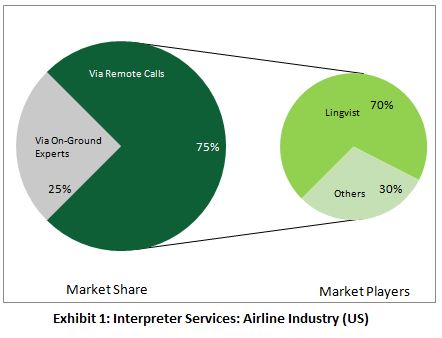
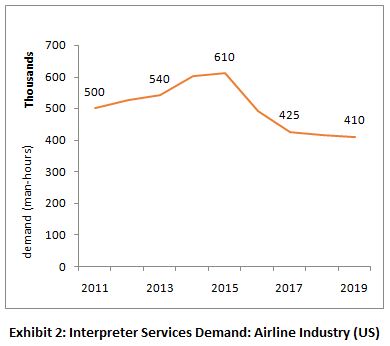
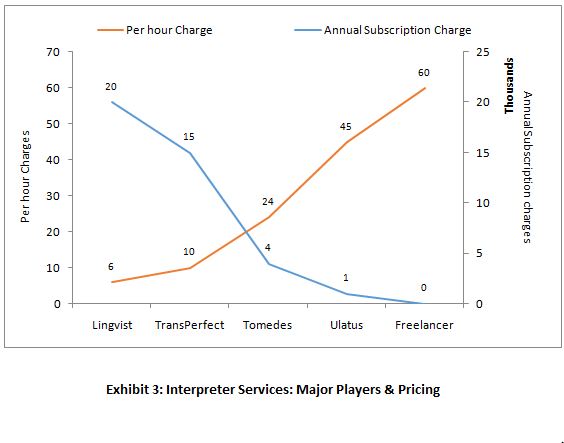
Notes for Interviewer: From the above exhibits, a good candidate should conclude that gaining additional market share in the airline industry may turn out to be resource intensive process for Lingvist. Moreover additional growth thus achieved may also not be sustainable for long as the interpreter services market itself is shrinking year on year for the airline industry.
Hence Lingvist must explore other industries as part of its future growth strategy plan.
Insights from the exhibits can be summarized as below –
- Exhibit 1: Interpreter Services in the airline industry is provided either in-person via on-ground experts or via online channels like remote calls
- Remote calls channel caters to a majority of market needs (~75%)
- Lingvist caters to 70% demand (market share) originating from online channels
- Exhibit 2: For the last 3-4 years; the demand for interpreter services is witnessing a decline in the airline industry
- Exhibit 3: Lingvist is a premium service provider in the category ($20,000 as annual subscription charge with $6 per hour service availing charges over it)
Basis above insights it can be concluded that there is not much juice left for Lingvist in the airline industry; as the market itself is shrinking and Lingvist already enjoys a very high market share in it. Attempting to gain a higher market share under these conditions with premium pricing may eventually turn out to be a costly affair with non-sustainable returns.
Hence Lingvist must explore other industries as part of its future growth strategy plan.
Question 3: Ask the candidate to highlight a few potential industries and business cases wherein services from Lingvist can fit in as it is?
Notes for Interviewer: A few of the potential industries which the candidate can mention are as captured below –
- Hospitality & Travel
- Government & Public Sector
- Legal, Banking & Finance
- Healthcare etc
Interviewer should keep pushing candidate to think and add more to the list until he mentions healthcare.
Question 4: Suggest the candidate to focus his analysis on the healthcare industry. Share with him the following exhibits and ask him his opinion if Lingvist should expand their offerings in Healthcare?
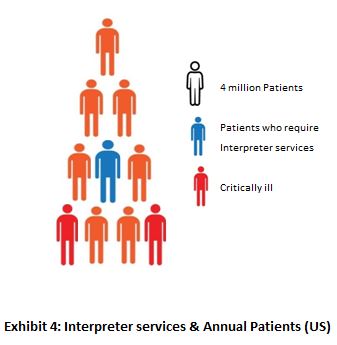
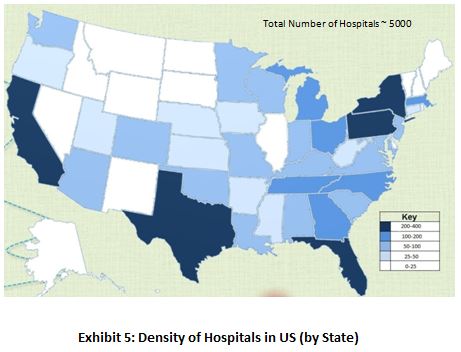
Additional information with Exhibits
Following information is to be shared with the candidate along with above exhibits (mandatorily) –
- In-person Interpreter services is a must for patients with critical illness and for ones suffering from psychological disorders
Following information is to be shared with the candidate only if requested –
- Interpreter services market in healthcare industry is highly fragmented and dominated by Freelancers; providing in-person services on request
- A person would be categorized as Patient only if he gets admitted to the hospital
- Average time spent on interpreter services per year per patient = 120 mins
Notes for Interviewer: Candidate is expected to derive potential market size of interpreter services in healthcare industry using following insights drawn from above exhibits –
- Exhibit 4: Annual Patients (people who get admitted to hospital) = 40 million
- Exhibit 4: Patients who require interpreter services = 4 million (~ 10%)
- Exhibit 4: Patients with critical illness = 8 million (~20%)
- Patients with critical illness & require interpreter services ~10% or 0.8 million
- Exhibit 5: Number of hospital in US ~ 5000
In the process, candidate is expected to inquire about the interpreter service charges & average service utilization time per patient per year in the healthcare industry. Interviewer must use the information provided in the additional information section to respond to these questions.
A good candidate is expected to derive per hour service charges for Freelancers from Exhibit 3, (after knowing that healthcare industry is currently dominated by Freelancers.)
- Exhibit 3: Freelancers are charging $60 per hour for in-person interpreter services (No annual subscription charges required)
Conclusion
- Potential market size of overall interpreter services in healthcare industry can be calculated and pegged at ~ $480 mn
- Potential market size of online interpreter services can be calculated and pegged at ~ $385 mn
A good candidate would recommend Lingvist to focus on Healthcare industry in preparing its future growth strategy plans. (refer to detailed calculations section below for rationale behind this recommendation)

Lingvist is recommended to focus on Healthcare industry while preparing its future growth strategy plans as –
- Potential market size of online interpreter services in healthcare industry (~385 mn) is decent enough
- Current interpreter services are dominated by Freelancers. There is no direct competition and the current market is highly fragmented & un-organized
- Moreover, service quality provided by Freelancers can at-times be unreliable and non-standard. Thus creating a market gap for Lingvist to pitch in and capitalize
Question 4: What would be our value proposition to the healthcare customers? Why do you think hospitals would convert to our service?
Notes for Interviewer: A good value proposition must highlight both quantitative and qualitative benefits for healthcare customers availing service from Lingvist.
Quantitative benefits can be summarized as below –
- Hospitals are expected to save 51% of their current cost if they switch to Lingvist’s online interpreter services
Qualitative benefits to hospitals can be summarized as below –
- Service is expected to be more standard and reliable with Lingvist on board
- Lingvist can offer exclusive payment terms with lucrative credit periods to its customers
- Service can be scaled & de-scaled at will and as per the requirement with almost zero efforts from hospitals
A good candidate may come forward with other quantitative & qualitative benefits as well. Interviewer is expected to accept any benefit that is supported with appropriate rationale.
To understand value proposition of Lingvist quantitatively, a cost benefit analysis is performed below to identify what hospitals are paying now vs what they would be paying if Lingvist gets on-boarded for availing interpreter services.
Current Scenario

Scenario with Lingvist
80% of the patients getting treated in hospitals can be switched to online interpreter services offered by Lingvist. (Other 20% patients with critical illness will still use in-person interpreter services of Freelancers). Therefore,

Thus, Hospitals are expected to save 51% in costs if they opt in for Lingvist as their major interpreter service provider.
Question 5: Ask the candidate to summarize his recommendations for CEOs brief
A good candidate should highlight that airline industry is already saturated for Lingvist services. Attempting to expand further in this industry would be a costly and a non-sustainable affair.
Lingvist is recommended to focus on healthcare industry because of its better growth prospects, as part of its future growth strategy plan.
An excellent recommendation will also include risks involved in expansion along with an action plan.
Lingvist solutions, an online on-demand service provider for language interpreter service is looking forward to identify focus points for its next growth strategy plan.
Lingvist is recommended to focus on expanding its services in the healthcare industry as –
- Demand for such services in the healthcare industry is decent enough and growing
- Current healthcare market lacks standardized & reliable interpreter service offerings. It is highly fragmented , unorganized and there exists no direct competition to Lingvist in the online space.
- Also, Hospitals (or, Customers) are expect to save 51% in costs if they opt in for Lingvist as their major interpreter service provider
Plan of Action (Next Steps)
- Devise an appropriate Go-To Market strategy
- Hiring & training of Sales executives to pitch in Lingvist’s services to potential clients
Risks involved
- Hospitals may resist switching to online services for psychological reasons
- Current Pricing plans may favor only the big customers (because of high subscription charges). On-boarding small hospitals would be a challenge with the current product pricing